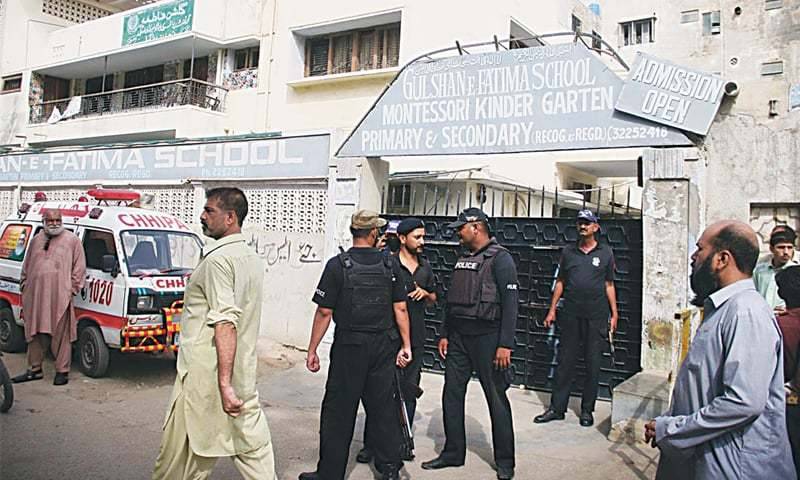“Teenage couple carries out ‘suicide pact’ in Karachi during school assembly” is the headline everywhere today. A tragedy that is developing as we speak, and we might come to know more about the circumstances surrounding the incident but the social media has already taken up its role as the judge, jury and executioner.
There are calls for stricter religious education, more segregation, banning of television and movies and for the “Fahashi” being taught in the schools everywhere. This judgemental knee-jerk response has become such a commonplace thing that we are surprised if it doesn’t happen. In fact, seeing it happen, seeing the indignant moral brigade come out and curse everyone reaffirms that the world is still alright. Sad as it may be, we are a product of our society and that is what we are trained to do.
Read: Matric student commits suicide after killing his class mate
However, the tragedy raises some very interesting questions – questions the 16-year-old me would like the answers to and I would try to answer him.
Question one: is a 16-year-old capable of marriage and taking it to its logical conclusion?
Question two: How could a 16-year-old get access to a lethal firearm so easily in this country?
Question three: How come nobody, the parents, the teachers, the school administration, no one, noticed any signs of something untoward like this happening?
First and foremost, suicide is not a laughing matter, no matter what the cause. If someone is pushed to the brink of nonexistence, there is bound to be something going horribly wrong somewhere in their life. Humans are programmed to stay alive, to survive. And to override that, you need to have a strong reason, be it clinical depression, grief, or the prospect of not being able to feed your children. That is why, with every suicide, we should look at the circumstances and see what led to it and make sure that we help people that are still suffering but have not gone to the brink yet. Maybe we would be able to save them.
On to the questions.
What exactly drove a 16-year-old and a 15-year-old to think about getting married? Now I don’t know their story but I’ll speculate based on my personal experiences and those of people I know. I will not say that “Marriage is a difficult decision” or other things of this sort because up until my generation it was not a decision: it was something that just “happened” to you. “Love Marriages”, as they are called are still a staple of cinema and television and are still something of a taboo that becomes the central point of discussion in every family gathering everywhere. The concept of choosing your own partner is only slowly gaining recognition and is still frowned upon in the society. So this brings us to the question: Why would 16-year-olds think this is a good idea?
It would be easy to blame the movies or the dramas or the songs or the books, but that is, quite honestly, a cop out. That is a way for us, the adults, to point fingers at someone else so that we aren’t implicated and we can keep our consciences clear. The prevailing sentiment is to blame the “fahashi” shown on “Indian cinema” except that’s not entirely true. The reason, as far as I can ascertain being a part of this society and having grown up through similar troubles is far more insidious: it is the society’s taboos on interactions between genders and the religious mindset that prevails.
It is no secret that adolescence is the most turbulent time in a person’s life. Puberty arrives and your body changes, hormonal changes manifest as secondary sexual characteristics and you start feeling romantic attraction towards others, according to your sexual orientation. The social cliques begin to form and the psyche developed earlier comes out in full force. The pressure for studies increases since you are at a make-it-or-break-it point.
Blog: When would our society understand that the concept of friendship is not restricted by gender?
The romantic attraction, especially in a society like ours, is considered extremely taboo. Under the surface, you have everything happening: people date, relationships form and break, children explore the physical levels of affection and love. This also causes an inordinate amount of guilt due to both social and religious taboos. One of the ways that kids that age think they can legitimize their attraction or infatuation is by “marrying”, since it will legitimize them in the eyes of god and society and they’ll be free to pursue their attraction. This is, for reasons obvious to us, the adults, completely stupid. That is not how love or relationships work and you cannot be expected to go from “Love at first sight” to “getting married” in a single leap. You could, ostensibly date and get to know the other person and how you two would fit together, but that is unacceptable in the society and the religion. There you have the Catch-22.
If the society were even marginally more accepting of inter-gender friendships and courtships, even under supervision, we would have significantly less cases of teenagers that are frustrated and torn between their “moral” issues and their need and requirement of exploring their sexuality. This segregation and mythification of normal genders and roles and friendships, is further cemented by the media at times which says that there can only be a wild romance and nothing else between the “hero” and the “heroine”. This contributes to a lot of the issues we face as a nation, from unhappy marriages with unrealistic expectations to rampant misogyny, sexual harassment and prevalent rape culture.
The next question is easy to answer: How could a 16-year-old get access to a lethal firearm? Because the regulation of firearms here is next to none. The legal ways to get a license and to be trained for the use are long and fraught with red tape, often requiring “approach” and “Chaye-pani” and there is a bulk of illegal firearm trade happening right under our noses. You can find any gun, even on some pages on Facebook and buy it. Seeing as this gun was not to be reused, I’m sure they wouldn’t have minded a cheap model. With guns being more common than roti in Pakistan, they could easily get access to it.
The bigger question is: how did the parents, teachers and the school administration not notice anything? This is not the point where I go on about the ridiculous state of mental healthcare in Pakistan since it’s not just mental health that is a problem. Our entire healthcare infrastructure has collapsed. That said, school should have noticed something. With the suicide notes released by media, it is easy to believe that the parents knew about it too. Now, what exactly happened that caused the children to decide to end their lives on an impulse, no one will ever find out. I can however say that what happens in general must have happened: viz, a lecture on family, honor and screaming and shouting.
As I have said before, the infatuation and the beginning of romantic attraction is common and is going to happen regardless of media; I’m sure that Heer and Ranjha were not avid fans of Bollywood or Hum TV dramas. The problem is how the society, the parents and the authorities react towards it. It is seen either as completely harmless play or it is seen as a problem with the family honor, leading to honor killings at times. Neither are the correct ways to deal with it.
In turbulent adolescence, the teenager thinks that they know everything there is to know about life and are ready to take everything on. They are wrong, as everyone learns once they become adults but they forget that that’s how everyone feels. Instead, in our society, parents try to bully the children just like they were five year olds. Sometimes this works and sometimes it leads to rebellious behavior leading to sad incidents like this. They are adolescents, standing on the brink of adulthood while still dealing with their childhood. They do not know how the world works. However, it then becomes the responsibility of the adults to educate them, to treat them in a way that they don’t feel belittled and actually take the advice on board.
The children are also not property that can be married off or traded. They are living breathing human beings. In our society, listening to what the child says is very rare and considered bad parenting, when it is the inverse. If you never listen to the child, how will he ever trust you or your advice? If the parents make the efforts for a better relationship with their children that is less like an authority and more like a safe place where they can share their problems, we would actually have a lot less problems. Even in the horrifying Kasur child abuse scandal, a tiny fraction of children found the courage to talk to their parents while most of them remained silent. There are hundreds of stories on social media which the victims feel comfortable sharing anonymously with the world, but mention how they couldn’t even talk to their parents about it. If that is how we are treating the children, then there is something wrong with us.
The schools, if they had proper mental health professionals and counselors available, would have been able to pinpoint the danger signs in all likelihood and maybe help the victims deal with the issues and talk to the parents as well. However, our attitudes towards mental health also mean that even seeking advice from a therapist is considered a shameful thing and bringing dishonor to the family. I hope this attitude changes, since it can help our nation in ways we can’t even imagine yet.
The incident is sad, there is no doubt. However, it was made possible by a lot of complex problems in our society. These problems are not the lack of religious education or coeducation, but our attitudes towards children, the developing sexuality of children and sexuality in general and how we raise our children to be more afraid than trusting. A lot of work needs to be done before we can even begin to creep towards a healthier mind-set as a nation but I hope we consider this incident as a wake-up call.






